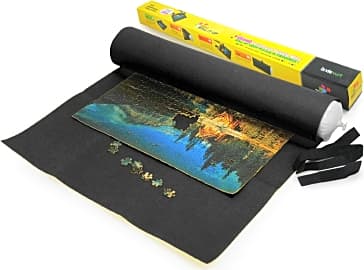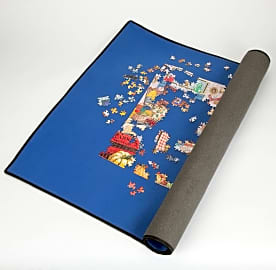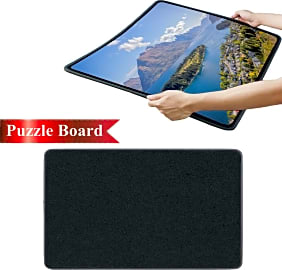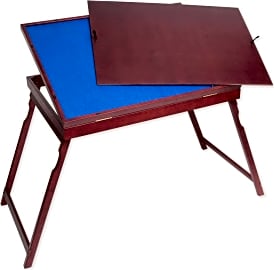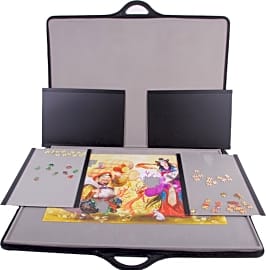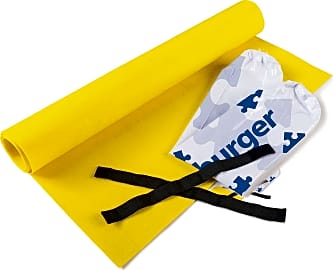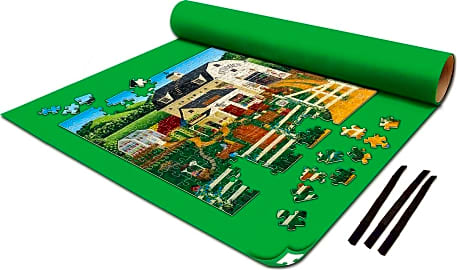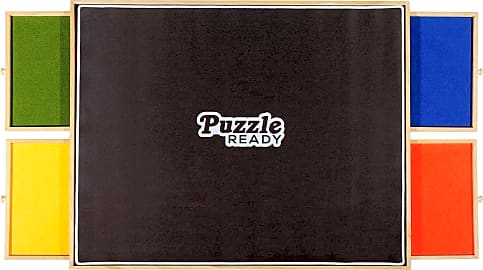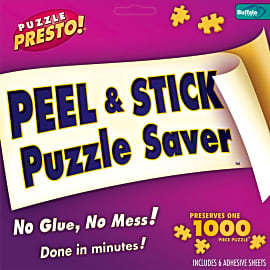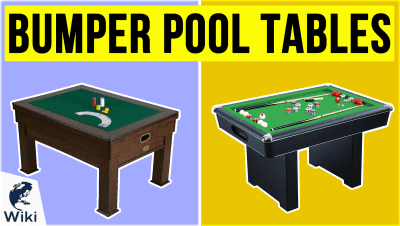The 10 Best Puzzle Mats

This wiki has been updated 35 times since it was first published in April of 2018. Completing jigsaws is among the most relaxing hobbies, unless you have to clear your dining room table for company or keep your cats from pawing your pieces. That’s where one of these mats will come in handy. We’ve selected a wide variety of puzzle savers and roll-ups, so you can spend more time working on your creations and less time guarding them against destruction. When users buy our independently chosen editorial recommendations, we may earn commissions to help fund the Wiki.
Editor's Notes
October 28, 2020:
As puzzle mats come under the broader category of "puzzle savers", this list has tried to reflect the numerous ways you can carry, store, and work on jigsaw puzzles. For example, we kept the Puzzle Presto! Peel & Stick Saver as this is an easy and affordable way to preserve your work when it's done, even if it offers little in the way of temporary storage solutions for half-finished jobs.
We also kept choices like Jigthings Jigsort 1500 because it is the only item that is carried like an artists portfolio, and the Bits and Pieces World's Best retained its place because it is the only roll-up version made from foam instead of felt.
The Ditome Movable Board needed to be changed as it is no longer available, so we added the Becko Board to satisfy the same needs as its predecessor, i.e. a lightweight working surface to move easily to the next room as and when required.
The Bits and Pieces Wooden Plateau was swapped for the newer Puzzle Ready Table as the latter has a removable protective cover and felt-covered drawers that are color-coded for easy reference.
The Bits and Pieces Foldaway Table was changed to the Bits and Pieces Tilt-Up Table as it offered more support in the legs, and the adjustable frame provided a comfortable solution for people who may find hunching over their puzzles difficult because they suffer from back or neck problems.
October 24, 2019:
At this time, we have kept a range of puzzle mat options, so there are choices for those who want a board to work on or a storage-only solution. In the former category, the Jigthings Jigsort 1500 remains a top contender, despite its 18-pound weight. Actually, this heavy construction is only a drawback when it's time to move the board, as the robust size makes it a sturdy place to work. But we added the Ditome Movable Board as a lighter alternative. It's not quite as hard, but it's less flexible than felt choices and can be walked from room to room without a lot of muscle. It would also make a fine surface for a 3D puzzle or card game. As for items designed for storage only, the Grateful House Premium remains a useful option. Unlike many, it arrives with a bag for twice the protection. Plus, we like that it comes in many colors for those who are choosy about that sort of thing. We also kept models from top names in this space, including the Ravensburger Stow and Go and the MasterPieces Jumbo. They're less expensive than the Grateful House model, but they don't offer any kind of storage bag.
Choosing A Puzzle Mat
We have a few tips to help you choose the one that's right for you.
Puzzles are tons of fun — until you need your dining room or coffee table back. But putting together a puzzle can take a long time, so you may find it tricky to clean up every time you need to take a break. Throw in a few curious animals or disruptive houseguests, and you'll have quite the tough time balancing your hobby with your life. But a handy puzzle mat will keep your home clean, prevent missing pieces, and make cleanup a breeze. We have a few tips to help you choose the one that's right for you.
The first thing to consider is color. While this choice is certainly about aesthetic value, the color can also make a big difference while you're working. Those who love bright, multicolored puzzles might appreciate a neutral mat, perhaps in gray or black, so the pieces stand out. On the other hand, if you often work with muted colors or pastels, a bright yellow mat might provide better contrast. And consider that you'll probably be looking at the mat for a while, so pick a color you won't mind staring at for hours.
The next thing to think about is whether you'd prefer a roll-up or flat mat. Puzzle mats that roll up tend to be more popular, simply because they are compact and highly portable. On the other hand, roll-up models require more time and effort when you're putting your puzzle away, whereas a flat mat usually zips closed in a flash. And, of course, a flat mat is portable, as well, but you often can't carry these vertically. This could be a nuisance if you're going farther than, say, from your living room to your guest room.
Last, but definitely not least, if you choose a roll-up mat, you'll need to decide if you want an inflatable or cardboard model. An inflatable option works just as you'd guess; you blow up the tube the mat wraps around. The potential drawback is punctures, although most can easily be patched. Cardboard tubes aren't subject to this issue, but they can't be deflated for flat storage when not in use.
The Missing Piece
Even if you’ve been scrupulous about keeping your puzzle on a mat, you may be faced with a missing piece from time to time, especially if you like to live on the edge and buy used puzzles. Don’t panic just yet, as there are a few options for filling in the gaps.
As you might imagine, this isn’t exactly cheap, but if you’re working on a puzzle you want to frame and keep, it might be your best option.
The first step is to contact the manufacturer. Some of the biggest puzzle makers have systems in place for providing consumers with replacements, although there’s no guarantee that they’ll have what you need. If the puzzle has been out of production for a long time, for instance, your efforts are not likely to pay off. Also, puzzle cuts can vary between production runs, so even if the design is in stock, the actual pieces may not fit.
Should the manufacturer not have what you need, you might consider a professional puzzle piece replacement service. These companies fabricate new pieces from scratch, generally after you send them the surrounding pieces for shape, size, and color matching. As you might imagine, this isn’t exactly cheap, but if you’re working on a puzzle you want to frame and keep, it might be your best option.
Your next step, if you prefer not to invest the cash, is to make a replacement. The process can be slightly complicated, depending on your skills in technology and crafting. Essentially, you’ll need to scan the picture, resize and print the missing part, secure it to cardboard, and cut it out with a sharp blade. Choose high quality materials and take your time, but remember that most finished puzzles are viewed from a distance — so small imperfections probably won’t be all that noticeable.
Finally, if all else fails, you could put out a call within puzzle groups on social media. It’s possible that another puzzle lover has the piece you need and is willing to give it up.
The Positives Are No Puzzle
You might pick up a jigsaw puzzle to have some fun or get through a rainy afternoon, and not because you want a brain workout. Nonetheless, you’ll be getting one, as puzzling offers many benefits.
Finally, working on a puzzle is a good way to beef up knowledge and memory.
For instance, putting together a puzzle is a good way to engage in mindfulness, which encourages relaxation. In today’s hectic world, it can be hard to slow down and remain in the present moment, especially when your phone won’t stop chirping and dinging. By putting these distractions aside to focus on putting together a puzzle, you can clear your thoughts and engage in the present moment. The ultimate benefit is a calmer, more relaxed state. You could even de-stress at work thanks to a portable puzzle mat.
But you won’t simply be relaxing when you put the pieces together; you’ll be improving your visual and spatial reasoning, too. Spatial ability is crucial in seeing and making sense of how objects fit together. You engage in this type of intelligence every time you park your car, navigate from a map, or pack a suitcase, and it’s essential in many fields, including engineering and architecture. Working on jigsaw puzzles is a good way to build some of the subskills that make spatial tasks easier.
Putting together puzzles can also be an excellent activity for preserving brain health. Although experts don’t completely agree on how far problem-solving activities go toward preventing dementia, most state that keeping the brain “in shape” certainly can’t hurt. In other words, puzzles and board games might not be the silver bullet that stops Alzheimer’s, but they could be a positive contributor to general mental abilities as people age.
Finally, working on a puzzle is a good way to beef up knowledge and memory. In fact, the first puzzles featured pictures of maps and were handy in teaching geography. Today, you can still find map puzzles of all shapes and sizes, as well as plenty of other varieties to help you learn everything from the periodic table to human anatomy.


